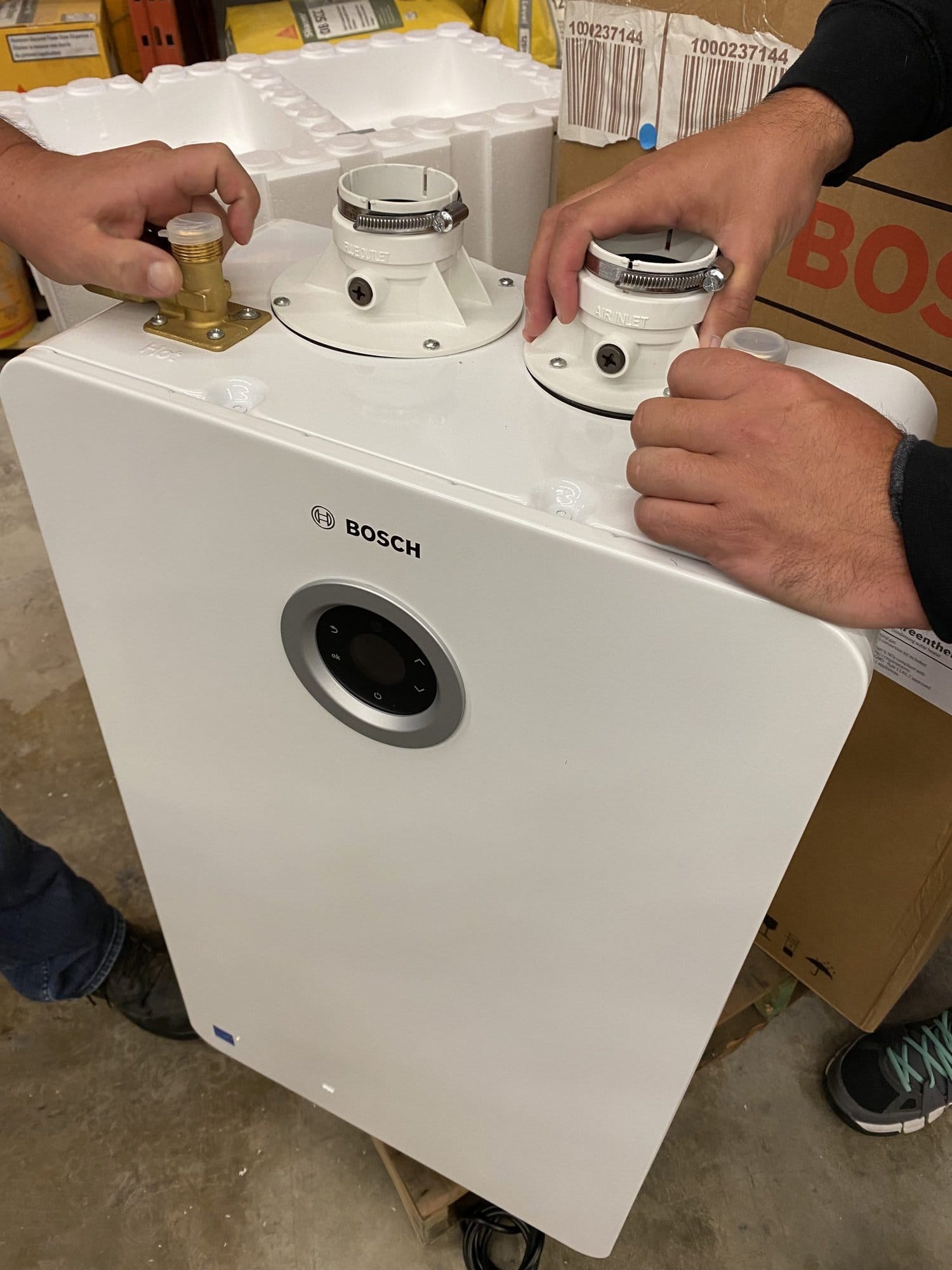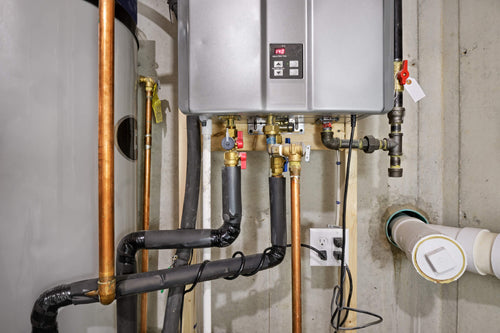Major Benefits Families Obtain From Tankless Water Heaters
Major Benefits Families Obtain From Tankless Water Heaters
Blog Article
The article down below on the subject of Pros and Cons of Tankless Water Heater is exceedingly remarkable. Don't bypass it.

In a globe where comfort and performance reign supreme, it's not a surprise that homeowners are continuously in search of smarter ways to handle their home's power intake and comfort. One technology that has actually gradually obtained appeal is the tankless hot water heater. Yet just what makes these systems stand out from the standard tank-based designs the majority of us grew up with? Let's dive in and check out the advantages of tankless hot water heater, aiding you choose if it's time to make the switch in your home.
Introduction
Picture this: you enter the shower after a lengthy day, anticipating a comforting waterfall of warm water, just to be welcomed by icy beads since the last individual used everything up. Noise familiar? Standard hot water heater keep a fixed quantity of warm water, indicating you're at the mercy of that container's supply. Tankless systems, on the other hand, warmth water as needed. No more going out mid-shower, say goodbye to wrestling with schedules simply to ensure warm water is offered.
Comprehending Tankless Water Heaters
What Are Tankless Water Heaters?
Tankless hot water heater, sometimes referred to as on-demand or instant hot water heater, give hot water only as it's required. Rather than keeping gallons of pre-heated water, these systems kick into activity the minute you activate the tap. Water travels through a warmth exchanger, heating up in real-time, indicating you get an uninterrupted flow of hot water without the requirement for a huge storage tank resting idly by.
How Do They Vary from Traditional Solutions?
Conventional heating units hold a storage tank of warm water, using power to keep that storage tank at a constant temperature. Tankless devices remove the standing supply, reducing squandered energy and the cumbersome impact of a huge cylinder. Basically, you're updating from a "accumulation" state of mind to a "made-to-order" method.
Usual Types of Tankless Systems
Tankless hot water heater typically are available in two selections: gas and electrical. Gas designs tend to supply greater circulation prices, ideal for larger houses, while electric designs frequently serve smaller sized homes and are commonly easier to set up. In addition, some systems are developed for point-of-use (offering one component) while others can handle the whole home's hot water requirements.
Trick Benefits of Tankless Hot Water Heater
Power Performance and Price Savings
No more heating up a giant container's worth of water and keeping it warm throughout the day. Tankless heating units decrease standby power losses, which can reduce energy bills. While the preliminary price could be higher, the lasting savings commonly warrant the investment.
3. Space-Saving Design
If your home is short on storage space, eliminating the bulky tank liberates useful room. Tankless units are compact and can commonly be placed on walls, stashed in edges, or mounted in limited energy storage rooms without grabbing all of the whole space.
4. Longer Life expectancy
A well-kept tankless water heater can outlive its tank-based relative. Typical tanks could last 10-15 years, while tankless designs can keep downing along for twenty years or more, making them a strong investment over time.
1. Countless Hot Water Supply
Ever before had to schedule showers so every person gets their reasonable share of warm water? With tankless, that ends up being a distant memory. As long as the heating unit's flow capability isn't gone beyond, you can take back-to-back showers without becoming a popsicle.
5. Improved Water Quality
Storing water in a storage tank can often cause debris buildup or a somewhat "off" preference. With tankless systems, fresh water is heated up on the spot, lowering the chances of debris buildup and potentially using cleaner-tasting water.
Considerations Before Changing
Though the advantages are engaging, it's important to think about a couple of aspects before totally committing.
Evaluating Your Home's Water Use Patterns
If your family all at once utilizes multiple fixtures with high hot water need, ensure the device's flow price fulfills your needs. Understanding your use patterns aids you pick the appropriate size and kind of tankless heating unit.
Upkeep and Care Tips
Tankless systems are fairly reduced maintenance, yet they aren't set-it-and-forget-it home appliances.
Routine Cleansing and Descaling
Hard water minerals can build up in the warm exchanger, impacting performance. Routine descaling (frequently suggested each year) keeps the system performing at peak performance.
Annual Professional Inspections
A yearly checkup from a specialist guarantees minor problems are captured early. They'll analyze the unit's performance, search for leaks, and help maintain ideal performance.
First Financial Investment Costs
Tankless heaters generally include a higher ahead of time price. Between the system itself and potential installation modifications, the initial cost could offer you sticker shock. But keep in mind to see it as a long-lasting investment.
Installation Demands
Relying on your home's infrastructure, you may require added electric capacity or gas line upgrades. Guarantee you recognize the installment needs and consult with a specialist to stay clear of shocks.
Making Sure Proper Ventilation
For gas models, correct ventilation is vital to securely expel exhaust gases. See to it airing vent systems are tidy and properly installed to avoid any type of possible safety hazards.
Contrasting Different Brands and Models
Not all tankless water heaters are developed equal.
Investigating Dependable Makers
Try to find reputable brands with a history of creating high quality systems. A trustworthy manufacturer usually offers much better customer assistance and longer guarantees.
Setup: Do It Yourself or Expert?
While some home owners enjoy tackling jobs themselves, tankless installation may not be the best time to break out the tool kit.
Benefits and drawbacks of Do It Yourself Installation
A DIY set up can conserve cash, but it features threats. Incorrect installation can bring about inadequacy or safety issues. If you come in handy and have experience, it could be viable-- yet wage care.
Checking Out Reviews and User Feedback
Customer testimonials and responses from neighbors or good friends that have gone tankless can use useful insights. Sometimes, real-life experiences can be more telling than marketing sales brochures.
When to Call an Expert Plumbing
For most, calling a pro ensures every little thing's done correctly. An expert plumber comprehends local codes, sizing demands, and airing vent criteria, lowering the danger of accidents.
Optimizing Effectiveness
You have actually purchased a tankless system-- currently optimize its effectiveness.
Optimum Temperature Level Settings
Most individuals set their devices between 120-140 F. Readjusting the temperature can enhance convenience and savings. Experiment to discover a pleasant spot that does not waste energy.
Pairing with Low-Flow Fixtures
Intend to extend your unit's abilities? Consider installing low-flow showerheads and faucets. They minimize water use, permitting your tankless system to supply a steady stream of hot water without stressing.
Ecological Effect
Tankless hot water heater line up with greener living objectives.
Minimized Carbon Impact
By utilizing less power and just home heating water as needed, tankless systems can decrease your home's carbon footprint, reducing your ecological impact.
Conserving Natural Resources
Much less power intake and much less wasted hot water translate right into fewer natural resources being made use of, an ecological win-win.
Who Profits A Lot Of from Tankless Heaters?
The elegance of tankless heating units is that they can fit a selection of households.
Big Family Members vs. Solitary Occupants
Big family members may enjoy the endless hot water supply, while single residents value the energy financial savings from not warming a whole tank for just someone's early morning shower.
Home Owners with Minimal Area
If your home is short on square footage, losing the bulky storage tank frees up area for other essentials-- or perhaps simply much more elbow room.
Eco-Conscious Customers
Going tankless aligns with eco-friendly values, guaranteeing you're not losing energy or sources.
Future Patterns in Tankless Hot Water Heater
The world of home devices is ever-evolving, and tankless water heaters are no exemption.
Developments in Modern technology
R&D is regularly enhancing warmth exchangers, making systems extra efficient and long lasting. Future models might be even quieter, a lot more portable, and much better matched for varying environments.
Smart Home Integration
Think of readjusting your hot water heater's temperature through an app or getting upkeep informs on your phone. As clever home technology advances, we'll see more connectivity and convenience.
Conclusion
Choosing a tankless water heater is greater than just upgrading your home's warm water system; it's buying long-term convenience, power effectiveness, and a greener lifestyle. By considering your home's water usage, bearing in mind installment needs, and dedicating to regular maintenance, you can enjoy a constant stream of warm water without the luggage of a bulky container. As innovation advances, you can eagerly anticipate even smarter, extra efficient tankless options that not only make your life easier however also benefit the earth.
Pros and Cons of Tankless Water Heaters
Tankless Water Heater Pros
Saves Energy: Simply put, you re spending less energy to create hot water, so your total carbon footprint goes down, not to mention your bills. Lasts Longer Than Storage Tanks: Storage tank units need to be replaced every 15 years or so. But tankless units? They can last for 30 years before they give out on you. Constant Hot Water: Need to take a shower and don t want the water running cold? Awesome it won t. The water will stay hot the entire time because it creates hot water on demand. Saves You Money: Less water usage equals less money. Beyond that, you re not paying to keep water hot 24/7. Those savings add up quickly. Better for the Environment: Less water waste is better for everyone. It saves you money, but it s also environmentally conscious at the same time. Tankless Water Heater Cons
It Can Take a Minute: Depending on your specific unit and its placement, it can take anywhere from 10 seconds to 2 minutes to fully heat up. Because there s no storage tank, it heats water as you need it. Upfront Purchase Price: While we talked about their longevity, there s sticker shock when you look at brand-new tankless units to install. It pays for itself, but it s still a big chunk of change at first. Has its Limits: If you run multiple appliances at once, such as the dishwasher, washing machine, and maybe you take a shower at the same time, there might not be enough hot water. https://www.airsouthnow.com/blog/water-heater-service/pros-and-cons-of-tankless-water-heaters/

As a serious reader on Pros and Cons of Tankless Water Heater, I thought sharing that piece of writing was essential. Those who enjoyed reading our blog posting kindly be sure to pass it around. I love your readership.
View More Report this page